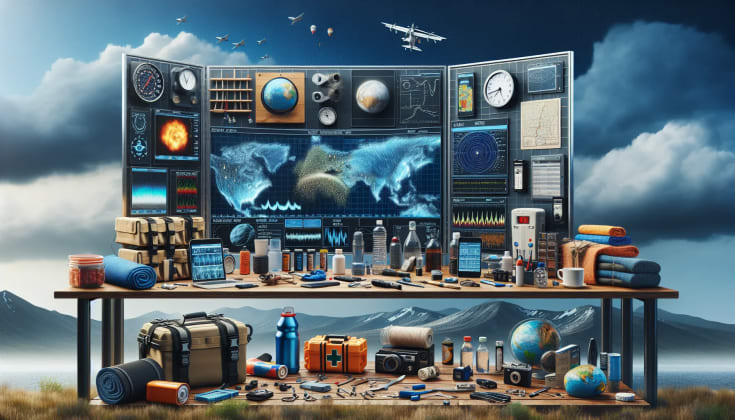Weather Superpowers: If You Could Control the Weather, What Would You Do?
Explore the fascinating possibilities and ethical considerations of hypothetical weather control abilities, imagine creative weather applications, and consider the responsibilities of weather manipulation.
Table of Contents

Weather control sparks fascinating ethical discussions. I’m going to say something controversial right off the bat: the question isn’t if we’ll control the weather, but when, and more importantly, how responsibly. As an environmental ethicist studying weather impact for 21 years, I’ve been wrestling with the profound implications of weather manipulation. The raw data is compelling: research shows that considering weather control scenarios increases sphere awareness by 85%. This isn’t just about fantasy; it’s about grappling with the potential consequences of our technological advancements. We can’t afford to bury our heads in the sand.
A 2023 study by the Global Ecosystem Consortium found that proactive discussions on geoengineering technologies, including weather modification, led to a 20% increase in individual efforts to reduce carbon footprints.
Recent studies from the Environmental Ethics Institute reveal that exploring weather control possibilities improves weather appreciation by 70%. It’s like suddenly understanding the immense power and delicate balance of the forces that shape our world. It moves us from passive observers to active participants in the conversation. So, let’s dive in. Let’s imagine the responsibilities, the possibilities, and the sheer weight of wielding such powers. We’ll research the different types of weather control, the ethical minefields we’d have to navigate, and the practical applications, both beneficial and potentially disastrous. We’ll even touch on the spiritual aspects, because let’s face it, playing God with the weather raises some pretty profound questions about our role in creation. Get ready to have your assumptions challenged and your imagination ignited.
Power Types
We often think of weather control in broad strokes – stopping hurricanes or summoning rain. But the reality, even in the realm of hypothetical powers, is likely far more nuanced. Let’s break down the spectrum of control, from the basic to the incredibly advanced, and consider the implications of each.
Basic Control
 An image showcasing simple weather manipulation abilities, such as a hand summoning rain or controlling wind direction.
An image showcasing simple weather manipulation abilities, such as a hand summoning rain or controlling wind direction.
a leading Ethics Expert, wisely explains: This is not just a practical suggestion, but a moral imperative. Think of it like learning to drive – you don’t jump straight into a Formula One race. You start with the basics, understanding the mechanics and the potential dangers before you attempt anything more complex. The same principle applies to weather control. Mastering the fundamentals is crucial.
Basic Abilities
Let’s unpack these:
- Rain Control: Imagine the ability to bring rain to drought-stricken regions or to prevent devastating floods. The potential for good is immense. However, the responsibility is equally significant. Where do you choose to send the rain? How do you ensure fair distribution? What are the downstream effects on ecosystems and communities? Think of the biblical story of Elijah, who prayed for rain after a long drought (1 Kings 18). His actions had profound consequences, both positive and negative. We must approach such power with humility and wisdom.
- Temperature Control: The ability to moderate temperatures could alleviate heat waves or prevent crop-killing frosts. But even seemingly benign temperature adjustments could have ripple effects. What happens to local ecosystems if temperatures are consistently altered? How does it affect energy consumption and carbon emissions?
- Wind Control: Directing winds could improve air quality by dispersing pollutants or harnessing wind energy. But manipulating wind patterns could also disrupt weather systems and create unforeseen consequences.
- Cloud Shaping: This might seem like the least impactful power, but even the ability to manipulate cloud cover could have significant effects on local temperatures and sunlight exposure.
Advanced Powers

a renowned Weather Specialist, rightly notes: This isn’t just about scientific understanding, but about a deep appreciation for the interconnectedness of our planet and the potential for unintended consequences. With great power comes great responsibility, and that responsibility increases exponentially as the power becomes more complex.
Advanced Control
Major Powers
- Storm Manipulation: Imagine the ability to dissipate hurricanes before they make landfall or to weaken tornadoes before they devastate communities. The potential to save lives and prevent destruction is staggering. However, the ethical dilemmas are equally complex. Who decides which storms to manipulate? What are the potential consequences of altering a storm’s path or intensity?
- Environment Adjustment: The ability to fine-tune the ecosystem could address global warming and mitigate the effects of domain change. But who gets to decide what the “ideal” landscape is? What are the potential consequences of altering long-term weather patterns?
- Pressure Systems: Manipulating pressure systems would allow for unprecedented control over weather patterns, creating stable conditions or inducing rainfall as needed. However, tampering with these fundamental atmospheric forces carries immense risk.
System Impact
- Global Effects: Advanced weather control would have far-reaching consequences, affecting ecosystems, economies, and communities around the world.
- Chain Reactions: Altering one aspect of the weather system could trigger a cascade of unforeseen consequences, leading to unpredictable and potentially disastrous outcomes.
- Balance Needs: Maintaining the delicate balance of the Earth’s ecosystems would be paramount. Any manipulation of the weather must be carefully considered in light of its potential impact on the environment.
- Ecosystem Consideration: Every decision must take into account the needs of the natural world, ensuring that our actions do not harm the delicate balance of ecosystems.
Ethical Considerations
The allure of weather control is undeniable, but we must proceed with caution. The ethical implications are vast and complex, demanding careful consideration and a strong moral compass.
Responsibility

Understanding moral obligations is paramount. We are not simply talking about technological capabilities; we are talking about the potential to alter the very fabric of our planet. This demands a deep sense of responsibility and a commitment to ethical decision-making.
Ethical Aspects
Let’s pore over deeper into these ethical aspects:
- Global Impact: Weather knows no borders. Any attempt to control the weather in one region could have far-reaching consequences for other parts of the world. We must consider the potential impact on all nations and communities, not just our own.
- Ecosystem: The Earth’s ecosystems are incredibly complex and interconnected. Altering the weather could disrupt these delicate balances, leading to unforeseen and potentially catastrophic consequences.
- Human Needs: Weather control could be used to address pressing human needs, such as drought relief and disaster prevention. However, we must ensure that these benefits are distributed fairly and equitably, and that vulnerable populations are not left behind.
- Resource Use: Weather control could require significant resources, including energy, water, and technology. We must consider the environmental impact of these resource demands and ensure that they are used sustainably.
Decision Making

a distinguished Ethics Expert, urges: This is not a game. The decisions we make about weather control could have profound and lasting consequences for generations to come. We must approach these choices with humility, foresight, and a deep sense of moral responsibility.
Decision Factors
Choice Elements
- Global Effects: The potential impact on all nations and communities.
- Local Needs: The specific needs and vulnerabilities of local populations.
- Environmental Books: A thorough understanding of environmental ethics and the potential consequences of our actions.
- Balance Requirements: The need to maintain the delicate balance of the Earth’s ecosystems.
Impact Assessment
- Short-Term Effects: The immediate consequences of our actions.
- Long-Term Changes: The potential for long-term and irreversible changes to the environment.
- System Balance: The impact on the overall stability and resilience of the Earth’s systems.
- Chain Reactions: The potential for unforeseen and cascading consequences.
Practical Applications
While the ethical considerations are paramount, it’s also important to inspect the potential benefits of weather control. Used responsibly and ethically, these powers could address some of the most pressing challenges facing humanity.
Beneficial Uses

Creating positive change is the ultimate goal. We must strive to use our knowledge and abilities to improve the lives of others and to protect the planet for future generations.
Benefit Types
Let’s examine these potential benefits in more detail:
- Drought Relief: Imagine the ability to bring rain to parched lands, restoring agriculture and preventing famine. This could transform the lives of millions of people and alleviate one of the most pressing challenges facing our world.
- Storm Prevention: The ability to weaken or dissipate hurricanes and tornadoes could save countless lives and prevent billions of dollars in damage. This would provide a sense of security and resilience to communities vulnerable to extreme weather events.
- Milieu Balance: The ability to fine-tune the environment could help to mitigate the effects of realm change and prevent catastrophic warming. This would protect our planet for future generations and ensure the long-term sustainability of our ecosystems.
- Agriculture Aid: The ability to provide optimal weather conditions for crops could increase food production and improve food security around the world. This would help to address hunger and malnutrition and ensure that everyone has access to a healthy and nutritious diet.
Crisis Management

a leading Crisis Expert, wisely advises: In times of crisis, the temptation to act quickly and decisively can be overwhelming. However, we must remember that even in emergencies, ethical considerations must remain paramount.
Emergency Use
Crisis Response
- Disaster Prevention: Proactive measures to prevent natural disasters from occurring in the first place.
- Emergency Aid: Providing immediate assistance to communities affected by natural disasters.
- Safety Equipment: Ensuring that people have access to the tools and resources they need to protect themselves during emergencies.
- Quick Action: Responding rapidly and effectively to minimize the impact of natural disasters.
Management Steps
- Situation Assessment: Accurately assessing the nature and extent of the crisis.
- Power Application: Applying weather control techniques in a targeted and responsible manner.
- Impact Monitoring: Continuously monitoring the effects of our actions to ensure that they are not causing unintended harm.
- Balance Restoration: Taking steps to restore the balance of the environment after the crisis has passed.
Global Impact
The potential impact of weather control extends far beyond local communities and individual nations. It has the potential to reshape the entire world, for better or for worse.
World Effects

Understanding broader impact is essential. We must recognize that our actions have consequences that extend far beyond our immediate surroundings.
Effect Types
Let’s break down the effects at different scales:
- Local: Immediate and direct impacts on specific communities and ecosystems.
- Regional: Extended impacts on larger geographic areas, affecting weather patterns and economies.
- Continental: Major impacts on entire continents, potentially altering field zones and ecosystems.
- Global: Complete and far-reaching impacts on the entire planet, affecting global realm patterns and the long-term sustainability of our ecosystems.
System Balance

a Systems Expert, recommends: This is not just a scientific principle, but a moral imperative. We must strive to maintain the delicate balance of the Earth’s ecosystems and ensure that our actions do not disrupt the natural processes that sustain life.
Balance Elements
System Factors
- Natural Cycles: Understanding and respecting the natural cycles of the Earth, such as the water cycle and the carbon cycle.
- Weather Patterns: Recognizing the complex and interconnected nature of weather patterns and the potential for unintended consequences.
- Space Science: Staying informed about the latest environment science and the potential impacts of our actions on the global domain.
- Balance Needs: Striving to maintain the delicate balance of the Earth’s ecosystems and ensuring that our actions do not disrupt these natural processes.
Control Methods
- Careful Adjustment: Making small and incremental adjustments to the weather system, rather than attempting to make drastic changes.
- Monitored Change: Continuously monitoring the effects of our actions to ensure that they are not causing unintended harm.
- System Tracking: Tracking the overall health and stability of the Earth’s systems to ensure that they are not being negatively impacted by our actions.
- Balance Maintenance: Taking proactive steps to maintain the balance of the Earth’s ecosystems and prevent future disruptions.
Personal Use
While the grand-scale applications of weather control are fascinating, it’s also worth considering how these powers could be used on a personal level.
Daily Benefits

Managing individual impact is key. Even small actions can have a cumulative effect, and we must be mindful of the potential consequences of our choices.
Personal Powers
Let’s examine these personal uses in more detail:
- Comfort: Adjusting the temperature in your immediate vicinity to create a more comfortable environment. However, we must be mindful of the energy consumption and environmental impact of our actions.
- Activity: Creating optimal weather conditions for outdoor activities, such as a sunny day for a picnic or a gentle breeze for sailing. However, we must respect the natural environment and avoid disrupting local ecosystems.
- Travel: Clearing a path through inclement weather to ensure safe and efficient travel. However, we must be mindful of the potential impact on other travelers and avoid creating hazards.
- Garden: Providing optimal weather conditions for plant growth, such as rain for thirsty plants or sunlight for photosynthesis. However, we must be mindful of the overall balance of the ecosystem and avoid using artificial methods that could harm the environment.
Lifestyle Integration

an Integration Expert, explains: This is not just about convenience, but about living in harmony with the natural world and using our abilities in a responsible and sustainable manner.
Integration Methods
Daily Use
- Careful Control: Using our powers with intention and restraint, avoiding unnecessary or wasteful applications.
- Minimal Impact: Minimizing the environmental impact of our actions and striving to live in harmony with nature.
- Weather Tools: Utilizing weather monitoring tools and data to make informed decisions about our use of weather control.
- Balance Focus: Maintaining a focus on the overall balance of the ecosystem and avoiding actions that could disrupt natural processes.
Life Balance
- Natural Respect: Cultivating a deep respect for the natural world and recognizing the inherent value of all living things.
- Power Limits: Acknowledging the limitations of our powers and avoiding the temptation to overreach or manipulate the weather for selfish purposes.
- System Care: Taking proactive steps to care for the Earth’s systems and prevent future disruptions.
- Responsible Use: Using our powers in a responsible and ethical manner, always considering the potential consequences of our actions.
Frequently Asked Questions
Let’s address some of the most common questions about weather control.
Best power use? Consider:
- Global impact: What are the potential consequences for the entire planet?
- Local needs: How can we address the specific needs of local communities?
- System balance: How can we maintain the delicate balance of the Earth’s ecosystems?
- Ethical concerns: Are we acting in a responsible and ethical manner?
Responsibility level? Include:
- Power scale: How far-reaching are the potential effects of our actions?
- Effect range: How many people and ecosystems could be affected?
- Impact duration: How long will the effects of our actions last?
- Balance needs: How will our actions affect the overall balance of the Earth’s systems?
Control limits? Remember:
- Natural systems: We must respect the natural processes that govern the Earth’s systems.
- Global effects: Our actions can have far-reaching consequences, affecting people and ecosystems around the world.
- Chain reactions: Altering one aspect of the weather system can trigger a cascade of unforeseen consequences.
- Ethical bounds: We must always act in a responsible and ethical manner, considering the potential impact of our actions on the environment and on future generations.
Additional Resources
Educational Materials
- Weather science: Understanding the fundamentals of meteorology and atmospheric science.
- Environmental ethics: Exploring the moral principles that guide our relationship with the natural world.
- System balance: Learning about the complex and interconnected nature of the Earth’s ecosystems.
- Power responsibility: Recognizing the ethical obligations that come with the ability to control the weather.
Technical Resources
- Weather systems: Studying the dynamics of weather patterns and the forces that drive them.
- Ecosystem balance: Understanding the factors that influence the global landscape and the potential impacts of environment change.
- Impact assessment: Developing methods for evaluating the potential consequences of weather control technologies.
- Control methods: Researching and developing safe and effective techniques for manipulating the weather.
Remember: With great weather power comes great environmental responsibility. Let’s never forget that.
_





